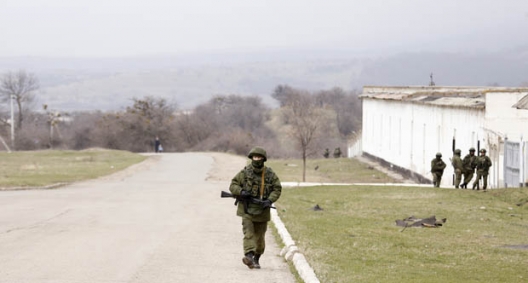
Ukrainian Troops Sustain Symbols of Sovereignty That Could Weaken Russia’s Grip
Twenty-four hours after being named to command Ukrainian forces in Crimea, Rear Admiral Denis Berezovsky switched allegiance to the Russia-installed Crimean puppet government. Accompanied by Russian special operations troops and unidentified gunmen, he strode into the Ukrainian military’s Perevalne base demanding that its soldiers surrender and swear allegiance to Russia. They refused. Forsaking their weapons, they pushed Berezovsky and his new forces out the front gate, locked it, and stood at attention singing the Ukrainian national anthem, “Ukraine Has Not Yet Died.”
These soldiers are not alone. According to Ukraine’s leaders, the government still controls 22 facilities on the peninsula including 16 military bases. Russia is trying to erase these vestiges of Ukrainian sovereignty without firing a shot.
Related Council Content
|
As Russian forces ferry thousands of new troops to the peninsula and build defenses to control access from the Ukrainian mainland, Western leaders have made clear that they will not intervene militarily. International attention is shifting to how to manage Russia’s takeover of the territory.
But this seizure is not yet a fait accompli. Like the soldiers at Perevalne, Ukraine and its partners should refuse to give up Crimea. International organizations and governments can take concrete steps to help the Kyiv government sustain its few remaining facilities, and its strong claim to sovereignty, on the peninsula.
In Crimea’s standoff, the unmarked Russian forces would like to provoke Ukrainian troops into firing the first shot, to provide a pretext for a massive Russian response. But Ukraine has neither the capacity nor the intent to defend these sites militarily. As a top Ukrainian official told me in Kyiv last week, the government is extending to Crimea the nonviolent resistance strategy from the months-long EuroMaidan protest. Still, the Ukrainian troops will fight if attacked.
Moscow is tightening its noose on Crimea. The Organization for Security and Cooperation in Europe authorized a monitoring mission to the territory, but Russian forces blocked it from entering. Unidentified pro-Russian gunmen in Crimea’s capital, Simferopol, surrounded and threatened the UN special representative, Robert Serry, and forced him to abort his own observation mission. And Russian forces laid mines along an access route to mainland Ukraine, to bar the entry of Ukrainian reinforcements and prepare for long occupation.
Despite the Russian pressures, ordinary citizens have begun helping to sustain the islets of Ukrainian government presence in Crimea. Local women are delivering food supplies to many of the government bases. Ukraine’s active women’s groups should lead a more organized humanitarian effort, and international nongovernmental organizations — such as the Red Cross and Red Crescent – should assist that campaign. Turkish and Romanian NGOs could ship humanitarian supplies quickly to commercial ports in Crimea.
These brave Ukrainians can sustain the will and courage to resist peacefully if they are aware that the world knows their plight. As the postal system still functions, citizens across Ukraine, the former Soviet Union, Europe and North America should begin mailing letters and care packages to these facilities.
In turn, the Ukrainians holding these facilities need to stay loyal to the tactics of the EuroMaidan – remain peaceful, stay united and develop plans to prolong their survival in place. Where possible they should get to know their captors – soldiers are less likely to shoot soldiers they know.
Ukraine’s authorities should re-assert their sovereignty (and raise the costs to Russia) in other non-violent ways. This should include a full-scale legal counter-attack to Russia’s invasion. Kyiv should use international courts and institutions to pursue war damage claims, should seek reparations for Russia’s interference with oil and gas exploration contracts off Crimea’s coasts, and should demand the preservation of assets of private Ukrainian businesses in Crimea.
Russian President Vladimir Putin understands that the Ukrainians now hold the moral high ground in international opinion, and Moscow recognizes the power this brings to their militarily weaker adversaries. In the Kremlin’s warped logic, if Russian officials don’t know acknowledge that the troops in Crimea are Russian, and if they shoot only once they are attacked, then their invasion of Crimea isn’t really an invasion, but indeed an effort to support and save threatened Russians.
Even if the Russians consolidate physical control over Crimea, they will not have secured a clear victory. In Ukraine’s 2001 census, 58 percent of Crimea’s residents identified themselves as Russian. But 24 percent described themselves as Ukrainian and 12 percent as Crimean Tatars – groups that are not interested in being controlled by Moscow.
Back in 1991, 54 percent of Crimea’s voters backed Ukrainian independence in 1991 (and that was absent the Tatars, whom Moscow deported en masse during World War II, and who began returning in numbers only after Ukraine’s independence). In recent years Crimean separatists have found little public support. The Crimean “prime minister” installed by Moscow, Sergey Aksyonov, leads a separatist party that won 4 percent of the vote in Crimea’s most recent elections, in 2010. Aksyonov, known by his mafia nickname, “the Goblin,” would hardly be the choice of most Russian Crimeans to lead them under any circumstance.
Ukraine and its partners should keep in mind these weaknesses in Russia’s seizure of Crimea. As Washington and European capitals rightly focus on how best to support Ukraine’s interim government and deter an expansion of Russian objectives inside Ukraine, they should not write off Crimea. Ensuring that Ukraine retains a presence on the peninsula creates an enormously complicating factor for Moscow.
Damon M. Wilson is executive vice president of the Atlantic Council.
Image: Armed men, believed to be Russian servicemen, are seen outside a Ukrainian military unit in the village of Perevalnoye outside Simferopol, March 11, 2014. REUTERS/Vasily Fedosenko
